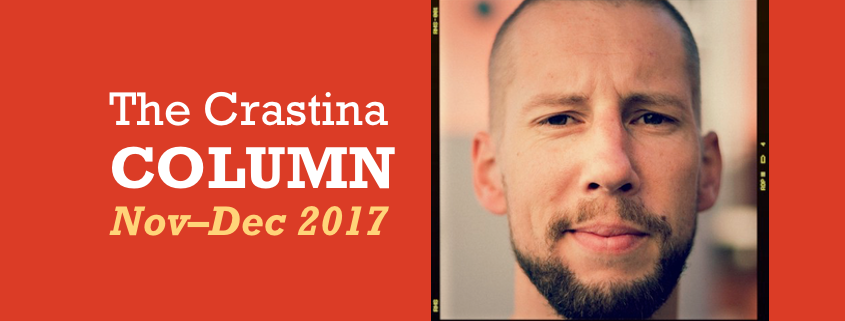Crastina Column, Nov–Dec 2017: ”Why you A-B-S-O-L-U-T-E-L-Y need a personal website as a scientist” by Stephan van Duin
Being a scientist means that you need to promote yourself as skilled and influential individual in your professional field. Accordingly, a personal website seems to be an obvious tool for a science or tech person with great ambitions. Here Stephan van Duin from The Online Scientist explains why in closer detail.
The theme of Crastina in November/December 2017 is “the scientist’s personal website”.
 There is a need to align science more with the society it is embedded in. This has led the European Union, for example, to require project proposals to cover the topic of ‘impact’. How will the results from your project influence society? This goes beyond the technicalities, because a major part is: how will you make sure that you have that impact, that people know about your project and its results?
There is a need to align science more with the society it is embedded in. This has led the European Union, for example, to require project proposals to cover the topic of ‘impact’. How will the results from your project influence society? This goes beyond the technicalities, because a major part is: how will you make sure that you have that impact, that people know about your project and its results?
Without going into detail here, it’s clear that having a website is the least you can do. And it’s a great way to stand out! Now, the first rule of standing out is that you shouldn’t be like everyone else. So while online networking tools for scientists, such as ResearchGate, Academia.edu and Google Scholar have their place, you’ll still be just one of many. This doesn’t help your visibility.
Make it your own
A website is a great way to overcome these challenges, by standing out and engaging the public. But you’ll have to go beyond that online profile that your institute provides for you on their website; these often convey a bland, generic image and have a design that is inflexible and generally outdated. To have a page with your photo and a list of publications is just not enough to get people excited about your work.
That’s why the best way to tell your story and create impact is to create your own professional website. On your own website you can show your work (with images and video!) but also share your vision and vent your opinions. It’s also the best way to be found by search engines, and as a bonus you’ll get to keep this website when you change employer.
Practice ground
A final, but perhaps hidden, value of going out there and engaging a diverse public, and dealing with the variation of opinions, critiques and feedback as well as having to explain your work to a varied public, is that it makes you a versatile presenter. By having to explain your project to different audiences, you become better at fine tuning your message to your desired audience – also when that audience is a grant reviewing committee or policy makers. And by dealing with critique and feedback, you learn to justify your project and its intricacies in setup – both to yourself and others.
Summary
So, you need a personal website. Why? Because you need to stand out. Because you need to have a consistent presence when you change employers. Because the university profile isn’t sufficiently yours, and an academic networking site is too closed off. Because it gives you the opportunity to learn to communicate to a wide variety of audiences, including your peers.
Stephan van Duin
- Claire Price of Crastina receives outreach award from Royal Society of Biology - October 25, 2020
- Agile Science student project at Brussels Engineering School ECAM: “We can’t wait to try it again!” - August 28, 2020
- Create an infographic in the Lifeology SciArt Infographic Challenge - June 16, 2020
- Adam Ruben – The scientist that teaches undergraduate students comedy - March 27, 2020
- Sam Gregson, Bad Boy of Science: “Comedy helps to bridge the gap” - March 10, 2020
- The Coolest Science Merchandise of 2019 - December 16, 2019
- Science Media Centre (UK) offers guide on dealing with online harassment in academia - November 26, 2019
- Agile project management taught to students and researchers at Karolinska Institutet - September 20, 2019
- Stefan Jansson: Improve your credibility! (Crastina Column, September 2019) - September 6, 2019
- The People’s Poet: Silke Kramprich, tech communicator - August 31, 2019





Trackbacks & Pingbacks
[…] Further reading: Why you A-B-S-O-L-U-T-E-L-Y need a personal website as a scientist […]
Leave a Reply
Want to join the discussion?Feel free to contribute!